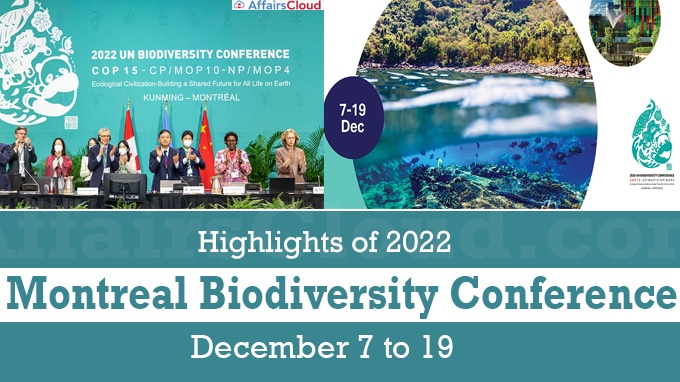 From December 7 – 19, 2022, the United Nations (UN) Biodiversity Conference was held in Montreal, Quebec, Canada to acknowledge new set of goals to guide global action through 2030 in order to prevent nature loss.
From December 7 – 19, 2022, the United Nations (UN) Biodiversity Conference was held in Montreal, Quebec, Canada to acknowledge new set of goals to guide global action through 2030 in order to prevent nature loss.
- It comprised of the 15th meeting of the Conference of the Parties (COP 15) to the Convention on Biological Diversity (CBD), 10th Meeting of the Parties to the Cartagena Protocol on Biosafety (Cartagena Protocol COP/MOP 10), and the 4th meeting of the Parties to the Nagoya Protocol on Access and Benefit-sharing (Nagoya Protocol COP/MOP 4).
It should be noted that the COP 15 was held in two phases. Phase one took place virtually, from 11 to 15 October 2021 while Phase two was held as a part of above mentioned Biodiversity Conference.
Points to be noted:
i.The president of COP15 was China.
ii.India was represented by Union Minister Bhupender Yadav, Ministry of Environment, Forest, and Climate Change (MoEF&CC)
Global Biodiversity Framework adopted
The conference saw the adoption of the Global Biodiversity Framework (GBF) that addresses the key drivers of nature loss, and promotes health and well-being of mankind and planet.
- It will replace the Aichi Biodiversity Targets, comprises 22 targets and four goals proposed for 2030, a stepping stone to the 2050 goal of Living in Harmony with Nature.
Aim:
To protect the world’s lands and oceans and provides financing to save biodiversity in the developing world.
Key Highlights:
i.The framework envisages to protect 30% of land and 30% of coastal and marine areas by 2030, up from an earlier aim of 20%. It will fulfill the deal’s highest-profile goal, known as 30-by-30.
- Currently, such protection covers 17% of land.
ii.It also calls for raising $200 billion by 2030 for biodiversity financing from a number of sources.
iii.Funding to poor countries by wealthier countries should be increased to at least $20 billion each year by 2025, and then increase to $30 billion each year by 2030.
iv.Companies should analyse and report how their operations affect and are affected by biodiversity issues.
v.Countries should identify subsidies that deplete biodiversity by 2025, and then eliminate, phase out or reform them. These incentives should be slashed by at least $500 billion a year by 2030, and increase incentives that are positive for conservation.
vi.It pledged to reduce pesticides by ‘at least half’.
India urges dedicated fund for biodiversity conservation
India made an urge to create a new and dedicated fund to help developing countries successfully implement a post-2020 GBF to stop biodiversity loss.
- Currently, the Global Environment Facility which caters to multiple conventions, including the UNFCCC (United Nations Framework Convention on Climate Change ) and UN Convention to Combat Desertification (UNCCD), remains the only source of funding for biodiversity conservation.
The conservation of biodiversity must also be based on ‘Common but Differentiated Responsibilities and Respective Capabilities’ (CBDR) as climate change also impacts nature.
UN recognises Ganges project among 10 initiatives restoring natural world
The UN has recognized India’s Ganges project among 10 initiatives from globe that restore the natural world. The initiatives were declared World Restoration Flagships and are eligible to receive U.N.-backed promotion, advice or funding.
- They were selected under the United Nations Decade on Ecosystem Restoration, a global movement coordinated by the U.N. Environment Programme (UNEP) and the U.N. Food and Agriculture Organisation (FAO).
Key points:
i.The movement is designed to prevent and reverse the degradation of natural spaces across the planet.
ii.Together, the 10 flagships aim to restore more than 68 million hectares, an area bigger than Myanmar, France or Somalia, and create nearly 15 million jobs.
iii.The other inaugural World Restoration Flagships include the Trinational Atlantic Forest Pact, which aims to protect and restore the forest in Brazil, Paraguay and Argentina, and the Abu Dhabi Marine Restoration project which is safeguarding the world’s second-largest dugong population in Abu Dhabi.
- The Great Green Wall for Restoration and Peace initiative, the Multi-Country Mountain Initiative based in Serbia, Kyrgyzstan, Uganda and Rwanda, the Small Island Developing States Restoration Drive focused on three small island developing states – Vanuatu, St Lucia and Comoros, Altyn Dala Conservation Initiative in Kazakhstan, the Central American Dry Corridor, and Shan-Shui Initiative in China were also recognised.
About Government-led Namami Gange initiative:
The government-led Namami Gange initiative is rejuvenating, protecting and conserving the Ganga and its tributaries, reforesting parts of the Ganga basin and promoting sustainable farming, according to the statement.
- The project also aims to revive key wildlife species, including river dolphins, softshell turtles, otters, and the hilsa shad fish.
- The initiative, with an investment of up to $4.25 billion so far, has the involvement of 230 organisations, with 1,500 km of river restored to date.
‘Coalition for Nature’ formed by Small Island Developing States
A number of Small Island Developing States (SIDS) has agreed to form a ‘Coalition for Nature’ for the implementation and adoption of GBF. It will be led by Cabo Verde, Samoa and Seychelles.
- SIDS host 19% of the world’s coral reefs and their geographic isolation safeguards an array of endemic plants and animals found nowhere else on earth.
- The island states are responsible for an ocean area 28 times the size of their land mass.
Members:
i.Belize, Cabo Verde, Comoros, Dominican Republic, Guinea Bissau, Kiribati, Samoa, Saint Lucia, Sao Tome and Principe, Seychelles, Solomon Islands, Tuvalu and Vanuatu are the current members of the coalition.
ii.As of December 14th ,the Friends of the SIDS Coalition for Nature are Germany, France, Italy, Luxembourg, Monaco, the Netherlands, Portugal, Spain, and the United Kingdom.




